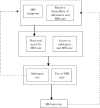Self-medication of mental health problems: new evidence from a national survey
- PMID: 15663705
- PMCID: PMC1361129
- DOI: 10.1111/j.1475-6773.2005.00345.x
Self-medication of mental health problems: new evidence from a national survey
Abstract
Objective: To evaluate the association between past 30-day use of alcohol, marijuana, and other illicit drugs and past year unmet need for and use of mental health care.
Data source: A subsample of 18,849 respondents from the 2001 National Household Survey on Drug Abuse and the 2002 National Survey on Drug Use and Health. Subjects were between the ages of 18 and 65 years and had least one past year mental disorder symptom and no past year substance dependency.
Study design: Logistic regressions of past 30-day substance use on past 12-month unmet need for mental health care and past 12-month use of mental health services controlling for clinical and sociodemographic characteristics. Predicted probabilities and corresponding standard errors are reported.
Principal findings: Use of illicit drugs other than marijuana increased with unmet need for mental health care (4.4 versus 3.2 percent, p=.046) but was not reduced with mental health-care use. Heavy alcohol use was not associated with increased unmet need for mental health care, but was higher among individuals with no mental health care use (4.4 percent versus 2.7 percent, p<.001). By contrast, marijuana use did not appear associated with either unmet need or mental health care use.
Conclusions: Substance use varies with past year unmet need for mental health care and mental health care use in ways consistent with the self-medication hypothesis. Results suggest that timely screening and treatment of mental health problems may prevent the development of substance-use disorders among those with mental disorders. Further research should identify subgroups of individuals for whom timely and appropriate mental health treatment would prevent the development of substance-use disorders.
Figures
Similar articles
-
The prevalence and correlates of untreated serious mental illness.Health Serv Res. 2001 Dec;36(6 Pt 1):987-1007. Health Serv Res. 2001. PMID: 11775672 Free PMC article.
-
Substance use behaviors, mental health problems, and use of mental health services in a probability sample of college students.Addict Behav. 2009 Feb;34(2):134-45. doi: 10.1016/j.addbeh.2008.09.004. Epub 2008 Sep 17. Addict Behav. 2009. PMID: 18851897
-
Epidemiology and health service resource allocation policy for alcohol, drug abuse, and mental disorders.Public Health Rep. 1984 Sep-Oct;99(5):483-92. Public Health Rep. 1984. PMID: 6435161 Free PMC article.
-
Combat and peacekeeping operations in relation to prevalence of mental disorders and perceived need for mental health care: findings from a large representative sample of military personnel.Arch Gen Psychiatry. 2007 Jul;64(7):843-52. doi: 10.1001/archpsyc.64.7.843. Arch Gen Psychiatry. 2007. PMID: 17606818 Review.
-
Services for perinatal women with substance abuse and mental health disorders: the unmet need.J Psychoactive Drugs. 1997 Jan-Mar;29(1):67-78. doi: 10.1080/02791072.1997.10400171. J Psychoactive Drugs. 1997. PMID: 9110267 Review.
Cited by
-
A couple-level analysis of participation in physical activity during unemployment.SSM Popul Health. 2017 Mar 4;3:294-304. doi: 10.1016/j.ssmph.2017.03.001. eCollection 2017 Dec. SSM Popul Health. 2017. PMID: 29349224 Free PMC article.
-
Education based on the theory of planned behavior to improve medication regimen adherence, hope and marital quality in patients with substance use disorder.BMC Public Health. 2024 Nov 14;24(1):3173. doi: 10.1186/s12889-024-20651-1. BMC Public Health. 2024. PMID: 39543522 Free PMC article. Clinical Trial.
-
Explanatory models and coping with alcohol misuse among conflict-affected men in Ukraine.SSM Ment Health. 2025 Jun;7:100398. doi: 10.1016/j.ssmmh.2025.100398. Epub 2025 Feb 8. SSM Ment Health. 2025. PMID: 40206815
-
Correlates of past-year mental health service use among Latinos: results from the National Latino and Asian American Study.Am J Public Health. 2007 Jan;97(1):76-83. doi: 10.2105/AJPH.2006.087197. Epub 2006 Nov 30. Am J Public Health. 2007. PMID: 17138911 Free PMC article.
-
Infant health production functions: what a difference the data make.Health Econ. 2009 Jul;18(7):761-82. doi: 10.1002/hec.1402. Health Econ. 2009. PMID: 18792077 Free PMC article.
References
-
- Chilcoat HD, Breslau N. “Posttraumatic Stress Disorder and Drug Disorders: Testing Causal Pathways.”. Archives of General Psychiatry. 1998;55(10):913–7. - PubMed
-
- Dixit AR, Crum RM. “Prospective Study of Depression and the Risk of Heavy Alcohol Use in Women.”. American Journal of Psychiatry. 2000;157(5):751–8. - PubMed
-
- Druss BG, Rosenheck RA. “Association between Use of Unconventional Therapies and Conventional Medical Services.”. Journal of the American Medical Association. 1999;282(7):651–6. - PubMed
-
- Eisenberg DM, Kessler RC, Van Rompay MI, Kaptchuk TJ, Wilkey SA, Appel SA, Davis RB. “Perceptions about Complementary Therapies Relative to Conventional Therapies among Adults Who Use Both: Results from a National Survey.”. Annals of Internal Medicine. 2001;135(5):344–51. - PubMed
-
- Frances RJ. “The Wrath of Grapes versus the Self-medication Hypothesis.”. Harvard Review of Psychiatry. 1997;4(5):287–9. - PubMed
Publication types
MeSH terms
LinkOut - more resources
Full Text Sources
Medical
Miscellaneous


